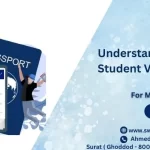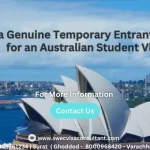Table of Contents
Many dependent visa holders wonder whether they can pursue education while accompanying their family members abroad. The good news is that many countries offer educational opportunities for dependents, allowing them to enhance their skills and career prospects. Studying abroad can provide dependents with high-quality education, international exposure, and better career opportunities.
Dependent visa holders often seek education abroad for various reasons, including career growth, skill enhancement, and better employment opportunities. Higher education institutions in countries like the USA, Canada, UK, Australia, and Germany offer world-class education and career-oriented programs for dependents. However, the rules and opportunities vary by country, making it essential to understand the regulations before enrolling in an educational program.
Can Dependent Visa Holders Study Abroad?
The ability of dependent visa holders to study abroad depends on the country they are residing in. While some countries allow dependents to study without any restrictions, others may require them to obtain a separate student visa. Additionally, some visa categories may limit dependents to part-time studies or specific courses.
Which Countries Allow Dependents to Study Without Restrictions?
- USA: F2 visa holders cannot enrol in degree programs but can take recreational courses. H4 and L2 visa holders can study without restrictions.
- Canada: Dependents on an open work permit or study permit can pursue full-time education.
- UK: Tier 2 and Tier 4 dependent visa holders can study without a separate student visa.
- Australia: Dependents of TSS, student, and PR visa holders can study, but school-age children may need to pay tuition fees.
- Germany: Dependents can enrol in universities, often with tuition-free education.
Do Dependents Need a Separate Student Visa?
In some cases, dependents may need to switch to a student visa if they wish to pursue full-time degree programs or if their visa status does not allow unrestricted education. Countries like the USA require dependents to transition to an F1 visa for full-time degree programs.
Part-Time vs. Full-Time Study Options for Dependents
Many countries allow dependents to study part-time on their current visa. However, if a dependent wishes to pursue a full-time course, they may need to apply for a student visa in some cases. It is crucial to check the visa regulations of the host country before making educational plans.
Best Countries Offering Educational Opportunities For Dependents
USA
Can Dependents (F2, H4, L2 Visa Holders) Study in the USA?
- F2 Visa Holders: Not allowed to pursue full-time degree programs but can take non-degree or recreational courses.
- H4 Visa Holders: Allowed to study full-time without restrictions.
- L2 Visa Holders: Can study full-time and may also be eligible for work authorization.
Restrictions on Full-Time and Part-Time Study
- F2 visa holders must switch to an F1 visa to pursue degree programs.
- H4 and L2 dependents can pursue undergraduate, postgraduate, or diploma programs without additional requirements.
Process to Change from a Dependent Visa to an F1 Student Visa
- Obtain admission to a SEVP-approved institution.
- Apply for a Change of Status (COS) with USCIS.
- Provide financial proof and supporting documents.
- Wait for approval before beginning full-time studies.
Canada
Can Dependents Study in Canada?
- Spouses and children of students and work permit holders can enrol in full-time education.
- No separate study permit is required for minor children attending primary or secondary school.
- Spouse dependents can apply for an open work permit while studying.
Benefits of Studying in Canada on a Dependent Visa
- Access to top universities and colleges.
- Eligibility for in-province tuition benefits.
- Dependents of international students may receive free public education (in some provinces).
Eligibility for Scholarships and In-Province Tuition Fees
- Certain institutions offer scholarships for dependents of international students.
- Many provinces provide domestic tuition rates for dependents of work permit holders.
UK
Study Rules for Dependents of Tier 2 and Tier 4 Visa Holders
- Tier 2 and Tier 4 dependents can study full-time without a separate student visa.
- No work-hour restrictions for study programs.
- School-age dependents can attend state schools for free education.
Can Dependents Apply for Undergraduate and Postgraduate Courses?
Yes, dependents can apply for undergraduate and postgraduate programs at UK universities without needing a student visa.
Work Opportunities During Studies
- Dependent visa holders may work while studying (except for Tier 4 dependents under 18).
- Work options include internships, part-time jobs, and post-study work visas.
Australia
Study Options for Dependents of Temporary Skill Shortage (TSS), Student, and PR Visa Holders
- Dependents can enrol in schools and universities.
- Spouses of student visa holders in postgraduate programs can work full-time.
- School-age children may need to pay international tuition fees.
Rights of School-Age Children and Tuition Fees for Dependents
- Free primary and secondary education for dependents in certain states.
- Some visa categories require payment of overseas student fees.
Difference Between Studying as a Dependent vs. Switching to a Student Visa
- Dependents can study part-time or full-time based on visa conditions.
- If applying for higher education, switching to a student visa may be required.
Germany
Can Dependents of Work or Student Visa Holders Study?
- Yes, dependents can enrol in public and private universities.
- Many German universities offer tuition-free education to students, including dependents.
Tuition-Free Universities and Affordable Education for Dependents
- Public universities in Germany charge low or no tuition fees.
- Dependents may need to pay for health insurance and living expenses.
Process of Enrolling in Higher Education Institutions
- Choose a tuition-free university.
- Meet admission criteria and provide language proficiency proof (German or English).
- Apply for a residence permit to study if required.
Education Levels Available For Dependents
Primary & Secondary Education
For dependent children of visa holders, accessing education is a primary concern. Many countries offer free or subsidized schooling, while others require international students to pay fees.
- Eligibility for Free Education:
- In countries like Canada, Australia, Germany, and the UK, dependent children of work visa holders are eligible for free or subsidized public education.
- The USA allows dependent children to attend public schools, but tuition fees may apply in certain states.
- Public vs. Private Schools:
- Public schools are often more affordable and follow the national curriculum.
- Private schools offer specialized curriculums (e.g., IB, A-levels) but have higher tuition fees.
- Admission Process & Documents Required:
- Passport and visa of the child and sponsor.
- Proof of residence in the country.
- Immunization records and previous school transcripts.
Higher Education (Undergraduate & Postgraduate Studies)
- Can adult dependents (spouses) enrol in university programs?
- Many countries allow spouses on dependent visas to study without restrictions (e.g., Canada, Australia, Germany).
- In the USA (H4 visa holders), dependents can study full-time but may need to transition to an F1 student visa for financial aid or work authorization.
- Difference between studying as a dependent and switching to a student visa:
- Studying as a dependent means limited work rights in some countries.
- Switching to a student visa provides better work opportunities and access to scholarships.
- Cost of Education & Eligibility for Financial Aid:
- Tuition fees for dependents vary by country and institution.
- Some universities offer discounted tuition for dependents of work visa holders.
Vocational & Skill-Based Training
- Are dependents eligible for technical courses and diplomas?
- Countries like Canada and Australia allow dependents to take vocational courses without a separate student visa.
- The UK and Germany offer certification programs in healthcare, IT, and skilled trades.
- Work-Integrated Learning Options:
- Internships, apprenticeships, and co-op programs are available in many vocational institutes.
- Certification Programs That Enhance Employability:
- Short-term diploma programs in IT, business management, healthcare, and hospitality help dependents gain skills for employment.
Scholarships And Financial Aid For Dependents
Can dependent visa holders apply for scholarships?
Many universities offer need-based and merit-based scholarships for dependents. Government-funded grants may be restricted to citizens or permanent residents.
List of International Scholarships Available for Dependents:
- Commonwealth Scholarships (UK) – Some universities extend this to dependent visa holders.
- Australia Awards Scholarships – Available for international students, including dependents.
- DAAD Scholarships (Germany) – Covers tuition and living expenses for dependents studying in Germany.
- Institutional Scholarships – Many universities provide tuition discounts or scholarships for spouses of students/workers.
Country-wise Financial Aid & Tuition Benefits:
- Canada: Some provinces offer reduced tuition fees for dependents of international workers.
- Australia: State-funded institutions provide subsidized fees for dependents.
- USA: Limited federal financial aid, but many universities offer institutional scholarships.
Student Loans for Dependent Visa Holders:
- Dependent visa holders may not be eligible for government-backed loans but can apply for private education loans with a co-signer.
Work While Studying: Can Dependents Earn While Learning?
Which Countries Allow Dependents to Work While Studying?
- Australia: Dependents of student visa holders (Subclass 500) can work unrestricted hours if the primary visa holder is studying a master’s or PhD.
- Canada: Spouses of study/work visa holders can work full-time with an open work permit.
- UK: Dependents can work full-time if the primary visa holder is studying at a postgraduate level.
- USA: H4 visa holders cannot work unless they obtain an Employment Authorization Document (EAD).
Work Hour Limitations for Dependents:
- Most countries limit work to 20 hours per week during term time and full-time during breaks.
Internship and Co-Op Programs for Dependents Studying Abroad:
- Many vocational and university programs offer paid internships and co-op placements.
- These work-study options provide practical experience and financial support.
Transitioning from a Dependent Visa to a Work Visa After Studies:
- Some countries allow dependents to apply for a Post-Study Work Visa after graduation.
- Countries like Canada and Australia provide clear pathways to permanent residency through skilled work programs.
Application Process For Dependents To Enroll In Educational Institutions
Step 1: Researching Study Options
Before applying, dependents must research study opportunities available in their host country. Key factors to consider:
- Choosing the Right Course & University:
- Check university rankings, course availability, tuition fees, and employment prospects.
- Look for institutions that offer tuition benefits for dependent visa holders.
- Understanding Education Policies for Dependents:
- Countries have different rules for dependents regarding studying on a dependent visa or requiring a separate student visa.
- Some nations allow full-time study without restrictions (e.g., Canada, Australia), while others require visa changes (e.g., the USA).
Step 2: Admission Requirements & Documentation
Each country and institution has specific admission requirements for dependent visa holders. Common requirements include:
- Passport & Visa Requirements:
- A valid passport and proof of a dependent visa status.
- Educational Transcripts & Qualifications:
- School or university transcripts and certificates of previous education.
- English Language Proficiency:
- Many universities require IELTS, TOEFL, or PTE scores, but dependents may qualify for exemptions based on residency or nationality.
Step 3: Applying for Study Programs
- Online Applications vs. Direct Admissions:
- Most universities accept applications via their official websites or centralized portals (e.g., UCAS for The K, Common App for the USA, ApplyBoard for Canada).
- Application Deadlines for Different Intakes:
- Most countries have two or three major intakes (Fall, Spring, and Summer).
- Application deadlines vary from 6-12 months before the course starts.
- Conditional Admissions & Pathways for Dependents:
- If dependents don’t meet language or academic requirements, they may get conditional admission and enrol in pathway programs or preparatory courses.
Step 4: Getting a Study Permit (If Required)
- When Do Dependents Need a Separate Student Visa?
- Some countries require dependents to apply for a student visa if pursuing full-time higher education.
- Example: USA (H4 visa holders need an F1 student visa to study full-time).
- Process of Switching from Dependent to Student Visa:
- Application submission with necessary documents.
- Visa interview (if applicable).
- Approval and transition to a student status.
Step 5: Tuition Fees & Payment
- Cost of Studying for Dependents vs. International Students:
- Dependents may pay reduced fees in some countries where local tuition applies.
- Example: Canada offers in-province tuition rates to dependent visa holders of work permit holders.
- Installment Payment Options & Financial Aid:
- Many universities allow tuition to be paid in instalments
- Dependents can explore scholarships, bursaries, and private education loans.
Challenges Faced By Dependents In Pursuing Education Abroad
- Visa Restrictions Limiting Study Options:
- Some countries restrict dependents from studying full-time on their current visa.
- Higher Tuition Fees for Dependents:
- In some regions, dependents must pay international student fees, which can be costly.
- Difficulty in Switching from Dependent to Student Status:
- The process can involve visa interviews, additional paperwork, and financial proof.
- Balancing Education with Family Responsibilities:
- Many dependent spouses have to manage studies alongside household and childcare responsibilities.
- Limited Work Opportunities While Studying:
- Some countries limit work hours for dependent visa holders, making it harder to fund education.
How SWEC Visa Can Help Dependents Study Abroad
- Expert Guidance on Study Options for Dependents:
- Personalized consultations on best universities, tuition benefits, and study pathways.
- Assistance in Visa Conversion from Dependent to Student:
- Help with paperwork, visa application processing, and approvals.
- Help with University Selection & Admission Process:
- End-to-end support in course selection, application submission, and interview preparation.
- Scholarship Assistance & Financial Planning Support:
- Guidance on applying for scholarships, tuition fee waivers, and student loans.
- Consultation for Work & Study Balance Abroad:
- Expert strategies to manage studies, work limitations, and visa compliance.
Conclusion
Educational opportunities for dependents abroad can enhance career prospects and personal development. Choosing the right country, university, and visa pathway is crucial for dependents who wish to study without restrictions.
With expert support from SWEC Visa, dependents can easily navigate visa transitions, secure admissions, and access financial aid. Consult SWEC Visa today and take the next step toward a brighter future!






